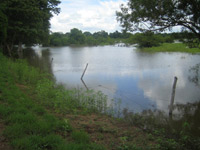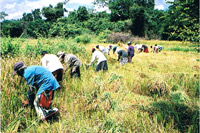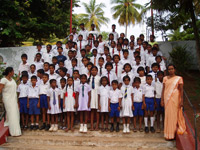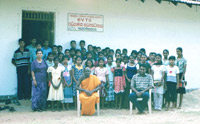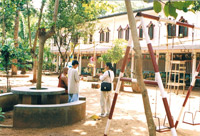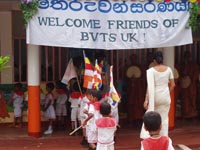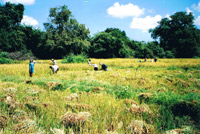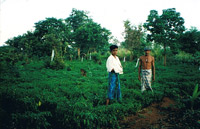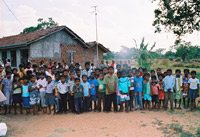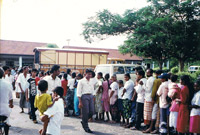

We undertake projects every year. The chosen villages are selected due to their remoteness and lack of facilities. These villages are visited several times to gain an overall view of the needs and to become part of a planned coordinated programme. Whilst on site we assess the needs and prioritise according to our budget. We meet with the village communities to discuss the programme. We share information and educate the villagers in the processes involved in maintaining a sustainable development.
|
|
WATER PROJECTS We undertake to repair or restore old reservoirs to store much needed water during the rainy season. Restoration of a reservoir enables 200-250 families to irrigate their land and hence farm their food crops. During the last 5 years we have restored 3 old disused reservoirs; Kokabe wewa in Tantirimale, Nuwaragalatenne wewa in Amparai District and most recently Siyabalawewa in Kahatagollawa near Padaviya. Construction of agro-wells is also undertaken. Each well provides water to support 10 farming families. |
|
|
|
EDUCATION B.V.T.S. has contributed funds for building a boys orphanage in Bandaragama, which houses many war victims. Computers have also been donated to educate them in I.T. Land has been purchased in Pilimatalawa to expand a girls orphanage, of which all are victims of war. We provide equipment and teachers’ salaries for many pre-schools in the remote areas of the North and East as well as in the Kandy district. Last year a building was restored in Embilipitiya for use as a pre-school for 150 village children. We also embarked on a 3 year pilot project to educate children, (in Horawapathana, Kebithigollawa and Padavi Siripara), in English and I.T. Already, over 850 students from deprived areas have benefited from these projects. Some have even been given further scholarships to do a diploma at Anaradapura’s I.D.M. Centre. This enables these children to have better employment opportunities, when before they had none. |
|
MEDICINES Free medical clinics in remote areas are held during weekends by volunteer medical/ dental staff. We fund expenses for travelling and medicines, over 1000 patients benefit at each session. |
|
BIO (ORGANIC)-FARMING…A NEW PILOT PROJECT The site for our Bio-Farming project is Siyabalawewa a reservoir we restored 2 years ago, together with 28 acres of farming land. We had many discussions with the village elders, agricultural officers and farmers to study the traditional farming methods. We felt that the modern day farmers should be educated in these traditional techniques and adopt them where possible as eco-friendly farming. In traditional farming, people looked to the land and the environment to satisfy their basic needs. We encourage the farmers to value these methods and re-establish an independent self-sufficient way of life. The modern system of farming introduces extreme dependence on outside factors and this leads to a vicious cycle of poverty. In this project, we encourage the farmers to have their own supply of seeds after initially donating them free seeds (developed on bio-farming methods). We also get them to make their own bio-fertiliser using leaf vegetation, animal waste etc. If needed the insecticides (which is very low with bio-fertiliser) from fermented plant extracts are used. This is eco-friendly bio-farming. Agricultural Officers will supervise the initial stages and will show the benefits to the environment, income and to the community. |
|
TSUNAMI RELIEF We provided emergency relief and funded medical supplies, school stationery, school uniforms etc for the tsunami children living in refugee camps. |
|
So far we are very happy with the progress they are making. B.V.T.S. also funded 40 families to help them re-establish their employment and livelihood post tsunami. The aid is to help them raise their next rice crop on new fields, which have been granted by the local council. As a result of the tsunami, the farmers lost their crops and their fields were turned into wasteland. In 2006 when we visited the farmers, they had had a bumper crop and used the profits to fund their next crop. This way they never have to borrow any money and are once again self-sufficient. |
|
|
|

